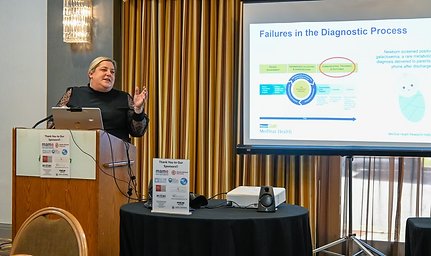
Conference attendees holding up their training certificates (Photo by PULSE Center for Patient Safety Education & Advocacy)
Lidia Mateus, a PhD student working within the Patient Partnered Diagnostic Center of Excellence (the Center), recently attended the PULSE 2025 Family Centered Patient Advocacy Training Conference. Lidia’s doctoral research focuses on diagnostic error among equity-deserving groups. She is interested in how patient advocacy can be used as a tool to reduce diagnostic errors in equity-deserving populations. In this blog post, she presents her reflections on the PULSE conference.
Reflections
I recently attended the Family Centered Patient Advocacy Training Conference hosted by the PULSE Center for Patient Safety Education and Advocacy. The conference provided a two-day training session focused on understanding sources of medical error during encounters with the health care system, and how patient advocacy can be used to avoid errors and support patient safety. Unlike academic conferences I’ve attended, the training conference had was geared towards a lay audience and emphasized sharing personal stories as well as practical information and tools to support attendees in working as effective patient advocates.

Lidia Mateus (right) attending the PULSE 2025 Conference
Topics of discussion included providing background on quality and safety in healthcare and the agencies responsible for ensuring this, becoming familiar with the various members of a medical team and their roles, understanding how medical error might occur, and clarifying the role of the patient advocate. The conference included both presentations and interactive activities aiming to illustrate how an advocate can understand the patient’s needs, respect their autonomy, and facilitate communication and understanding between the patient and providers.
Very early on in the conference it became clear that most attendees came to patient advocacy through their own lived experiences. Medical error had impacted almost everyone in the room, leading to their stories of caregiving, loss, and commitment to advocacy. As a researcher, these stories of navigating the medical system and the persistent experience of not having one's concerns taken seriously the first time they were voiced, were my greatest takeaways from the conference. I look forward to continuing to work with patients, caregivers, and patient advocates through the Center as we work towards understanding underlying causes of diagnostic errors.

Dr. Kristen Miller, Center Investigator, presents on engaging patients and family members to advance diagnostic excellence

Helen Haskell, Center Investigator, presents her family's experience with medical error
If you would like to learn more about the education and advocacy work of the PULSE Center, visit their website at www.PULSECenterForPatientSafety.org.
